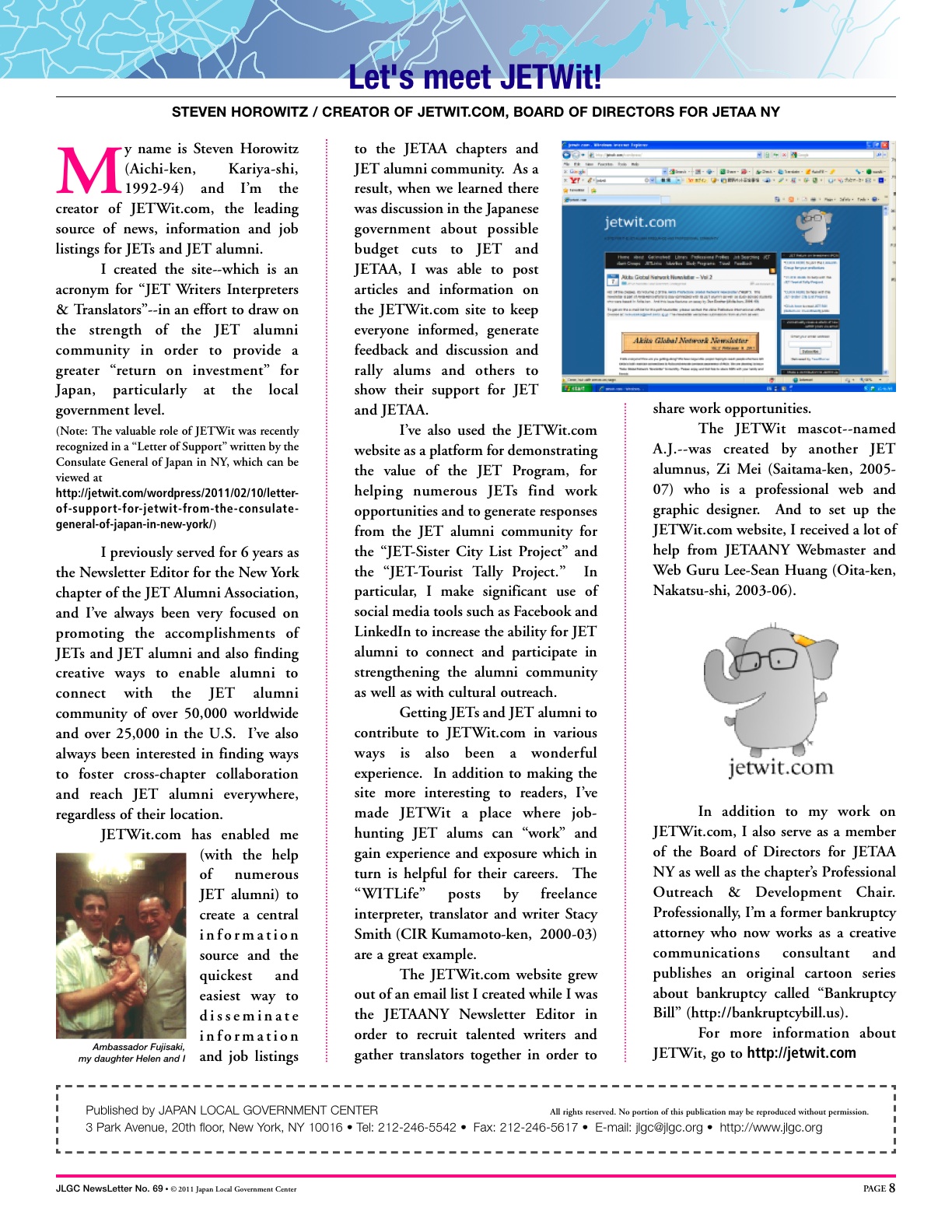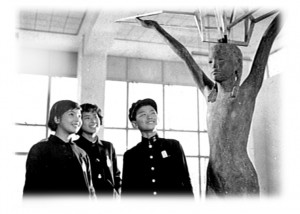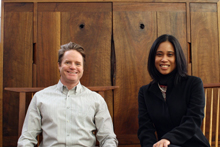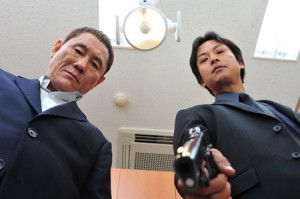CLAIR 2011 “JET Streams Newsletter”
Via CLAIR Tokyo:
Dear JET alumni,
- Here’s a link to the online version of this year’s JET Streams newsletter: http://www.jetprogramme.org/e/former/jetstreams.html
- Here’s a link directly to the PDF: http://www.jetprogramme.org/documents/pubs/JET%20STREAMS2011.pdf
JET Streams is distributed once a year to all JET alumni who request it and have registered their email address with CLAIR. Be sure to keep your email address updated so that you keep receiving JET Streams.
CLAIR would like to thank all the JETAA chapters and current/former JETs who contributed articles for this year’s JET Streams.
Table of Contents
- Greetings from Yoko Kimura, Chairperson of the Board of Directors
- JETAA Singapore: The New Kid on the Block
- JETAA Tokyo: A Closer Look
- JET Alumni Voices:
- Lorelei Cortez (Hyogo-ken, Santo-shi, 2004-07) of JETAA Northern California
- “Better Than a Thousand Days of Diligent Study” – Cristy Burne (Hyogo-ken, 1998-00) of JETAA Western Australia (Perth)
- “Shashinka – A Cultural and Visual Inspiration” – Stirling Elmendorf (Tokushima-ken, 2001-04) of JETAA Northern California
- Current JET Perspectives: “JET Island Life: Photographic Perspectives”
- JETAA International Meeting in Scotland
- Introduction of 2011-12 JETAA International Executive Committee
- Setting Up a JETAA Chapter
- From CLAIR Department of JET Program Management
- JETAA Chapter Representatives/Information
- Cartoon: “Final Thoughts” by David Namisato (CIR Aomori-ken, Ajigasawa-machi)
- “Words from the Editor” by Christian Tsuji
Miyagi JET writes of ruin, survival, rebuilding
The below letter by current JET Waylon Bryson (Miyagi-ken, Sendai-shi) appeared recently in the Washington State University student publication where Bryson attended college.
The following letter was sent to WSU history instructor Roger Chan, who taught author Waylon Bryson, a philosophy graduate of 2007. Chan shared it with Noriko Kawamura, associate professor of history, who passed it on for WSU Today to share with the university community. Bryson is working in Sendai, Japan as an English teacher. This fall he will attend Vanderbilt Law in Nashville, Tenn.
I have lived in the city of Sendai, Japan for the past three and a half years, where I teach English for the Japan Exchange and Teaching (JET) Programme. I was at my desk in the teachers’ room of Hachiken Junior High School when the earthquake struck.
Earthquakes are quite common in Japan and I, like the other staff members, paid little attention at first.
Then the room moved several feet. I had to physically hold onto my desk so that it wouldn’t move away from me. A control panel on the wall lit up like a Christmas tree and alarm bells started sounding. I could hear students screaming from the floors above as cracks snaked along the concrete walls and the building started groaning ominously.
CLICK HERE to read the full article on the WSU Today site.
Fukushima perspectives by a Fukushima JET alum
Thanks to JETAA Bluegrass Subchapter rep Roy Harrison for sharing the link to the excellent article by Fukushima JET alum and journalist Graham Shelby:
“JET Alum Graham Shelby put together a piece for the Louisville Courier-Journal about the experience of watching what’s happening in Fukushima from a distance that’s much greater geographically than it is emotionally.”
“Please give it a read. You’ll likely find it echoes the feelings you’ve been having for the past two weeks.”
http://www.courier-journal.com/apps/pbcs.dll/article?AID=2011303270046
Tokyo JET alum photojournalist seeks contact with displaced Tohoku JETs
Thanks to Ed Snook of JETAA Tokyo for sharing this information:
JETAA Tokyo member Wes Cheek is planning on visiting the Tohoku region beginning Friday for a photojournalism assignment. He has expressed an interest in trying to get in touch with JETs who may have been displaced by the recent earthquake/tsunami. Additionally, Wes welcomes contact from any family or friends of JETs in Tohoku who would like him to try and get in touch with JETs.
- To contact Wes, you can e-mail Ed Snook at career [at] jetaa-tokyo.org.
- For updates on Wes and more information about his trip, go to Wes’ blog where you can find details and updates about his trip.
JETwit featured in CLAIR NY (aka Japan Local Government Center) Newsletter
Here’s a link to the Spring 2011 Issue of the JLGC Newsletter, published bi-annually by CLAIR NY (aka Japan Local Government Center).
This issue includes a feature on JETwit.com (PDF) which I was asked to write a few months ago. It’s hopefully a helpful explanation of the background and purpose of JETwit. However, post-3/11 I have to admit it also feels dated and I feel somewhat conflicted about posting it now given what’s still going on in Japan.
Japan Times: How you can help – by JET alum Ashley Thompson
A really helpful article in the Japan Times titled “How You Can Help” written by JET alum Ashley Thompson, who also writes survival tips and unique how-to’s about living in Japan at www.survivingnjapan.com. (http://search.japantimes.co.jp/cgi-bin/fl20110322a1.html)
A few readers have questions about donating supplies.
WA writes: “I have seen the tragic earthquake and tsunami incident that happened in Japan. I would love to donate food and clothes and help out as much as I can. Please tell me where I can send supplies.”
And JF: “We are a primary school in the U.K. with a new school logo and are therefore changing our school uniforms. We have an enormous amount of clothing: sweatshirts, polo shirts, etc. that we would like to donate.”
From IF: “I would like to find out a way to donate clothes and other articles to people in need in Japan. I live in Heidelberg, Germany.
“The items I have are in very good condition and others are new. Could you please tell me how to proceed?”
Right now, most organizations are strictly asking for monetary donations, not clothing or supplies. The general advice is to donate money to organizations that can quickly and easily locate and deliver necessary items to disaster-hit areas. Particularly if you live outside of Japan, the best way you can help is to donate money through a trusted charity of your choice, or one that is Japan-specific, such as the Japanese Red Cross Society, Salvation Army Japan, Oxfam Japan, JEN, Jhelp and Second Harvest Japan, to name a few. There are many more but most require Japanese- language ability to navigate online.
Cash and checks can also be sent by registered mail to The Japan Times Readers’ Fund, The Japan Times, 4-5-4 Shibaura, Minato Ward, Tokyo 108-8071, with checks payable to The Japan Times Readers’ Fund. Donations will be used to support the work of Red Cross Japan and the Japan Emergency Team, operated by Jhelp.
You may also want to search online for a group in your region that may have connections with an organization in Japan and is accepting supplies for donation. If you are currently in Japan, you can donate monetarily to any of the organizations above, an organization of your choice, or even through local convenience stores and similar venues. If you’d like to donate food or supplies, Second Harvest Japan is accepting a long list of items such as canned or packaged food, toilet paper, toiletries, over-the-counter medicines, sleeping bags, etc. You can find a comprehensive list and mailing address on the Second Harvest Japan websitee.
Jhelp is also accepting donations for food and certain supplies — see their website for more information. Also, try contacting your local prefectural office, city hall or volunteer office in Japan. Many places are collecting supplies such as blankets, diapers, and toiletries. Please do not deliver supplies yourself — this creates confusion, adds to traffic congestion, uses much-needed fuel, and makes it more difficult for relief supplies to reach disaster areas.
On the topic of monetary donations, DG writes: “I live in Toronto, Canada, and wish to send my sympathies and condolences for the loss of life and property to the Japanese people.
“I would also like to donate money to a relief effort. I know that some relief agencies are less principled than others, and divert funds to their own pockets. Are there any you would recommend?”
And PD is wondering: “I am seeking a small NGO based in Japan that is sending responders. As the leader of a national religious organization, it is my intent to send the funds we collect to Japan for use by Japanese responders.
“Can you help us identify a place where our funding could help a small group providing services to those in need? Perhaps a shelter, food operation or clinic?”
Whenever you donate money, you should ensure the organization is reputable, trustworthy and has a good track record. If looking for a “small” nonprofit organization, be extra careful and confirm it’s not a scam.
The best approach to finding a charitable organization that deserves your gift is to research and decide for yourself which organization is best. Charity Navigator/ provides listings of many charities with specific financial information and rankings. Though you won’t find Japan-specific organizations, many of these are accepting donations for the Japan relief effort or will donate directly to a Japanese charity (such as the Japanese Red Cross Society).
In addition to those mentioned earlier, other reputable and frequently recommended charities in Japan include Global Giving, Save the Children, World Vision, Mercy Corps and UNICEF. Some of these charities have financial information in English, but many do not. There are far more small organizations in Japan, but again, most require Japanese-language ability to navigate online.
Readers P and N write: “We are so sad at what has happened in Japan and we pray for the people every day.
“We are retired and have a spare room and could easily take in a small family until things settle down.”
And from RJ: “My family is concerned about the problems Japan is having with the nuclear accident, earthquake and tsunami.
“We are a family of four living in England: My wife and I have two boys, ages 19 and 12. We can offer a couple of spare rooms for a parent and child. This would just be for a few weeks until the situation is better.”
If you are not currently living in Japan, perhaps another form of giving might be a better idea (see above). While a generous offer, the logistics of moving people overseas temporarily are often more complicated and expensive than relocating to another part of Japan. Keep in mind too that most people will need housing for longer than a few weeks, especially if they were to go overseas.
If you are residing in Japan and have room to take in evacuees, you might try checking out the Couchsurfing group set up for the current crisis in Japan.
Note: There are subgroups within this Couchsurfing group for people in other countries to volunteer a place for evacuees to stay. Additionally, the Accommodate Japan Facebook group has listings of people around the world offering housing to evacuees, so they may be good to connect with.
Reader TM writes: “I would very much like to go to Japan to help. I can self-finance for many months, but would love to find a place to stay and some kind of organization to help with. What would you recommend?”
Currently, first-responders are doing their jobs and it’s best for untrained volunteers to stay where they are until the situation has been completely assessed. So, unless you are a medical professional or have disaster relief experience, for now, giving monetarily is the most helpful thing you can do.
Some general advice: Please, do not go to the disaster area alone or without an organization. After assessment is complete, and the disaster relief teams have done their work, organizations (such as Red Cross and others) will likely begin taking volunteers. This may be a few weeks to a couple months away, so best to watch for that.
For those living in Japan: If you are currently able to access the disaster areas or able to work on site, Jhelp ) is looking for volunteers.
The Association for Japan Exchange and Teaching, Smile Kids Japan and folks from Jetwit have compiled a list of prefectural volunteer organizations. Some prefectures are now accepting volunteers, while others have not yet posted volunteer information, but it may be possible to connect with one of these groups. Contacts are listed for some PVOs, but for general inquiries, contact Avalyn Beare or Michael Maher King at volunteer@ajet.net.
With the current power supply issues at Tokyo Electric Power Co. and in the Tohoku region, and with the government urging residents to conserve electricity, many people are wondering if they should be conserving electricity outside of the Kanto region (such as in Chubu, Kansai, Chugoku, etc.)
As of now, Tepco has not needed to execute all planned blackouts due to residents and businesses decreasing electricity usage in the region. However, planned outages are still scheduled and will likely continue in the coming weeks.
According to the official websites of electric companies across west and southern Japan, which includes Kansai, Chubu, Chugoku, Kyushu, and Shikoku (no information for Hokuriku), all are covering the demand of their own regions and sending extra electricity to the Kanto region. However, west and east Japan use two different electric current frequencies, 60hz and 50hz, respectively, and as there are only three converter stations in the country, very little electricity can be converted and sent (Kansai Electric’s website says maximum capacity is 1,000,000 kw). Hokkaido is also supplying electricity for the Tohoku and Kanto regions, as they run on 50hz.
So, for residents of west Japan, conserving electricity during this time is certainly a good idea and highly encouraged, though it’s not necessary to take it to any extremes. Then again, it’s better for the environment to use as little electricity as possible, and a little easier on your bank account.
Kyodo News: Little Tokyo Community (LA) Mourns Tragedy, Rallies Support – by JET alum Jody Godoy
Kyodo News article by LA-based JET alum and Kyodo News reporter Jody Godoy (Fukui-ken):
Little Tokyo Community Mourns Tragedy, Rallies Support
Los Angeles Mayor Antonio Villaraigosa joined Japanese Consul General Junichi Ihara and more than 600 attendees at the Japanese American Cultural and Community Center in the Little Tokyo area on Thursday evening to mourn Japan’s quake and tsunami victims and show solidarity with the shaken country.
CLICK HERE to read full article.
The Encounter
Renay Loper (ALT, Iwate 2006-2007) is a freelance writer and international education professional currently seeking FT opportunities.
As we watch the news…check our emails…and receive phone calls and updates about what is happening in Japan daily, I am sure that images and fond memories of our time there flood our minds. Our hope, prayers, and positive energies remain with our friends, families, colleagues, and fellow JETs still in Japan.
I wanted to share a positive note and reflection that I wrote during my time as an ALT in Iwate. In the least, I hope I can incite a smile.
Enticed by your beauty and charm. My interest was peaked from the first time I heard about you…only in passing.
“I’ve got to meet her”.
I willingly left my land behind. Blindly following your majestic legend. Your mystery captivated me. I was led like a shy schoolgirl following a strange hand offering a piece of candy.
Not knowing where my decision would land me, I went.
Greeted by the rising sun, and the setting smiles. You hugged me. I hugged back.
I was consumed by your culture and charm. Your fickle mind left me unarmed. Your questioning eyes stare at me.
Piercing my being.
I want to give you my all. Share with you everything that I am. I am nervous. Borderline afraid. I am forced to ask myself, “why?” You have shared with me the intricacies of your history. Your timeless culture has embraced me.
Surely I can do the same.
Greeted by a room full of your children My worries are trumped, to return no more. You have welcomed me unconditionally.
To you, Lady Japan, I say thank you.
Published 2007 JET Journal
Earthquake: Interview with Spokane JET in Fukushima
Via PNWJETAA. Posted by Dipika Soni (Ishikawa-ken, 2003-06). Dipika currently works as an in-house translator for PFU (a Fujitsu company) in Kahoku-shi, Ishikawa-ken. She is also the vocalist for the Japanese hardcore punk band DEGRADE.
———————————————————————————————————————————-
The following is an Interview with Matthew Giles from Spokane who is a JET in Fukushima. This article was published by the Spokane Review.
“The earthquakes just keep coming.”
For recent Gonzaga University graduate Matthew Gilles, his dream job of teaching English to schoolchildren in Iwaki, on the northeast coast of Japan, has become something else.
“I hate it,” he said Friday. “Even when we’re not having an earthquake, my body is shaking.”
Gilles, 23, who has been in Japan since August, said small temblors are fairly common in Iwaki, so he didn’t respond at first when the big one hit Friday, shortly after he’d gotten off work earlier than usual.
For the rest of the article, click “Read More”.
Read More
Earthquake: Perspective From Japan
Written by Dipika Soni (Ishikawa-ken, 2003-06). Dipika currently works as an in-house translator for PFU (a Fujitsu company) in Kahoku-shi, Ishikawa-ken. She is also the vocalist for the Japanese hardcore punk band DEGRADE.
———————————————————————————————————————————-
“How can we help?” is the most frequently asked question I have been hearing over the last few days. For my neighbours in the small coastal town of Hodatsushimizu in Ishikawa prefecture, situated on the Sea of Japan, the horror of last week’s tsunami which effortlessly wiped out whole towns is only too poignant. Friends in my local JET and foreign communities are struggling to understand the truth of the situation due to the disparity between the seemingly down-played reports in the Japanese media and sensationalist approach to reports by certain western press. However, everyone is ready and willing to help in whatever way they can. Also eager to help are family and friends around the globe, who are constantly being bombarded with shocking headlines and devastating images of the disaster, causing tensions to run high as my presence in Japan makes them all the more connected.
When the earthquake struck shortly after 2:45pm Friday March 11th, I was sitting at my desk at work, when I started to feel a strange dizziness. It wasn’t until a minute later when other colleagues mentioned the same that we realized we were experiencing a tremor. Registering at only magnitude 3 here in Ishikawa prefecture, the earthquake was largely unfelt, with most people only noting a slight swaying and a seasick-like feeling. However, the length and number of aftershocks indicated the seriousness of the situation at the epicenter, as confirmed by the news reports that started to come in.
Like everyone else around the country (and world) we followed the news in disbelief and shock, uncertainty and a feeling of helplessness taking over. As the extent of the disaster began to unfold over the following days, these feelings have only intensified. While things remain calm and ‘normal’ here in Ishikawa (we are all going to work and have no shortages of food/water/electricity/gas), the nerves of the Japanese, foreign community, and family & friends back home are being tested daily. Although we are not directly affected here, we are all suffering from mixed feelings of fear, confusion, heartache and love for a country that is our home. For all of us now, remaining positive in the face of so much sadness and uncertainty is key.
How Can We Help?
[Donate Money]
This is the most effective and encouraged way to help. Various different funds and suggestions of organisation accepting donations have been doing the rounds. For direct donations to specifically address JET needs in affected areas, AJET has set up the AJET Relief Fund. (There are other recommended relief efforts supported by AJET also listed on the site). Also, the JET Alumni Association (JETAA) is organizing a large fund raising effort as well. Details to come.
Other suggested ways to donate:
Be careful to donate through official channels as reports of criminals using this tragedy for monetary gain are already being reported.
[Volunteer]
Planning is underway to assign volunteers once official groups can be coordinated. People are urged to stay where they are until official groups are in place. (The strain on limited supplies and infrastructure in the affected areas is already too great and unorganized volunteers would unfortunately cause more of a hindrance rather than a help).
Volunteer information once available will be posted on JetWit as well as on http://ajet.net/. Various groups that you can join have been set up on facebook, such as this one: I am/will be in Japan and want to volunteer in Tohoku
[Give Blood]
Check where you can donate locally. Here’s one resource listing blood donation rooms: Blood donation rooms etc. Do make sure to check if you can actually donate as there are strict rules. Here’s a good source of info on this: Who can and can not donate blood in japan
[Save Electricity and Don’t Over-Stock Supplies]
As scheduled blackouts are in place for most areas in the North-East, the whole country is being encouraged to save as much electricity as possible. Over stocking of supplies is being discouraged as panic has lead to stores selling out in the Tokyo area, raising concern that this will cause further strain on supplies needed in the worst stricken areas.
[Offer Your Couch]
A group has been setup on CouchSurfing where people in Japan can offer their homes as temporary accommodation for those affected by the earthquake. Check here: http://www.couchsurfing.org/group.html?gid=39703
Justin’s Japan: Earthquake and Tsunami Update ~ JET Alumni Aid and What You Can Do
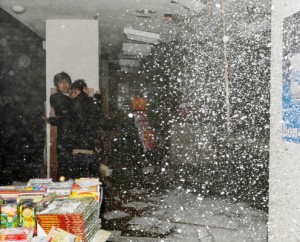
People take shelter as a ceiling collapses in a bookstore during an earthquake in Sendai, northeastern Japan March 11, 2011. (Reuters/Kyodo)
By JQ magazine’s Justin Tedaldi (CIR Kobe-shi, 2001-02) for Examiner.com. Visit his page here to subscribe for free alerts on newly published stories.
Friday’s Sendai Earthquake and Tsunami has devastated Japan, with Prime Minister Naoto Kan calling it the most difficult crisis for the nation since World War II. At this time, the death toll is expected to exceed 10,000, and the country’s workers are racing to prevent a nuclear crisis in the wake of aftershocks.
Helping those affected are participants of Japan’s international education exchange initiative the JET Program, along with its alumni association here in New York (of which this reporter is a member). Another member, Brooklyn resident Steven Horowitz, serves on JETAA New York’s board of directors and is the founder of JetWit.com, a global JET alumni resource site now featuring a significant stream of relief and support efforts updates via its 55,000 members worldwide.
“My goal is to make information available to people that might not be able to find it elsewhere, or in English,” said Horowitz, who worked on JET as English teacher in Aichi Prefecture in the 1990s. “JETs are ideal conduits for information, because so many JETs and JET alums are great at absorbing Japanese information and putting it out there in English through social media and other ways.”
While no integrated system has been set up at this time to accept donations in Japan, Horowitz has been sharing ways people can help, whether they’ve lived in Japan before or just have a desire to help.
“Since JetWit is a central communication platform for the JET alumni community, I’m trying to gather and disseminate as much information as possible,” Horowitz explained. “I’m doing my best to support the efforts of the Japanese government and disseminate the information to people who might need it.”
Click here for a listing of donation resources.
JET alum Washington Post reporter seeks contacts with relatives in Sendai
Via JETAA DC:
Hi all — I’m a Washington Post reporter and former JET (Hiroshima ’02) looking for any local dc-area connections to the quake for a story on local reaction. In particular seeking anyone who might have relatives in the Sendai region or any of you who were based there for JET and have friends/former colleagues there that you are trying to reach. We are on an immediate deadline, so please email me asap with a contact phone number if you have such a story to share.
Domo,
David Nakamura
nakamurad [at] washpost.com
JQ Magazine: JQ&A with Yumi Tanaka of the New York Peace Film Festival
By JQ magazine editor Justin Tedaldi (CIR Kobe-shi, 2001-02). For more Japanese culture, visit his Examiner.com page here.
Manhattan’s Upper East Side kicks off the weekend with the 4th Annual New York Peace Film Festival, which promotes a deeper understanding of international relations from films and presentations worldwide. Saturday focuses on the devastation of the atomic bomb, beginning with the 1958 Japanese film A Thousand Cranes, the story of young Hiroshima bomb victim Sadako Sasaki. JQ caught up with Yumi Tanaka, the festival’s co-founder and executive producer, for this exclusive interview.
Tell us a little about yourself.
I was born and raised in Japan and came to the States to attend college. Upon graduation, I landed a job and remained in the country. When I moved to NYC for a job, I also started taking an acting class. I thought it will help me at business meetings when I have to do a presentation. I loved theater since I was a child. My first experience was with the Takarazuka Revue at the age of three with my father. I studied theater, as literature helped me taking these acting classes, and I was recommended to do a stand-up comedy workshop then. That’s how I started doing stand-up comedy while holding a real job. Then, I pursued the entertainment industry. I took serious acting classes from a teacher who had taught many famous comedians like Ray Romano, and the list goes on.
It was 9/11 that changed my life. I wanted to do something more meaningful instead of being onstage at smelly comedy club to make drunks laugh. In 2005, I met a Hiroshima survivor visiting New York for an NPT [Nuclear Non-Proliferation Treaty] conference. He told me his life story; how he was hiding as a hibakusha [atomic bomb survivor] for a long time. Then, he said, “Hibakusha are getting older. If we all die, the, there’s no people who carry on to tell our stories.” That was the moment. I thought I could use my knowledge and experiences with theater to tell their story.
In 2006, I met Jonathan Fluck, who used to run children’s theater for over 20 years. He had just produced a poetry performance of Hiroshima and Nagasaki. A mutual friend introduced us. Although Jonathan had never been to both cities, his passion towards nuclear abolition was in sync. So we started the New York Peace Film Festival in 2007, and we’ve held one every year except 2009 due to the bad economy.
Exploring Eastern and Western Creativity: Q and A with Michael W. Morris – by Jennifer Olayon
Here’s a JET-relevant interview titled “Exploring Eastern and Western Creativity: Q & A with Michael W. Morris“ that appeared recently in AsianLife.com magazine and was conducted and written by former JETAANY President Jennifer Olayon.
Jennifer is a Contributing Editor for AsianLife.com magazine and previously served as a Senior Program Officer at Columbia Business School’s Center on Japanese Economy and Business. She is currently open to work and consulting opportunities in Human Capital Management and Diversity and Inclusion areas.
Michael W. Morris is the Chavkin-Chang Professor of Leadership and Director of Program on Social Intelligence at Columbia Business School and leading expert on relationships, conflict resolution, decision-making, and creativity, with a special interest in the role of culture.
Here’s an excerpt from the interview:
“There is a popular stereotype that Easterners are less creative; that they are imitative rather than inventive. While this stereotype is heard in the West, it is heard even more so in East Asia, which surprised me when I first began studying this topic. The creativity problem is a central topic in the social discourse of many East Asian nations, worried about making the transition from manufacturing economies to design and innovation-based economies. In bestsellers with titles like Can Asians Think? Asian polemicists have advanced theories about ways that Asian culture, language, socialization and schooling stunt creativity through hindering abstract critical thinking and molding conformist characters. This sells books, but I think it’s inaccurate.”
Justin’s Japan: NYC Hosts March Anime, Yakuza Film Fests

'Welcome to the Spaceshow,' an animated entry for this year's New York International Children's Film Festival. (Aniplex)
By JQ magazine’s Justin Tedaldi (CIR Kobe-shi, 2001-02) for Examiner.com. Visit his page here to subscribe for free alerts on newly published stories.
Anime sci-fi and a Studio Ghibli-inspired effort from China are the Eastern animation highlights at this year’s New York International Children’s Festival, running March 4 to 27 in Manhattan. The acclaimed festival received national attention two years ago when it hosted the premiere of The Secret of Kells, a European fantasy film that was later nominated for an Academy Award for Best Animated Feature.
North America’s largest film festival for children and teens, NYICFF offers an eye-opening selection of the best new animated and live action film from around the world for ages 3 to 18, with gala premieres, filmmaker Q&As, filmmaking workshops, pre-screening giveaways, audience voting, and the NYICFF Awards Ceremony. Its jury this year includes Uma Thurman, Matthew Modine, Susan Sarandon, Gus Van Sant, James Schamus, Christine Vachon, Michel Ocelot, and John Turturro.
From March 9-19, New York’s Japan Society simmers nearly 50 years of yakuza (Japanese mafia) movies—a mainstay of Japanese cinema—in the Globus Film Series Hardest Men in Town: Yakuza Chronicles of Sin, Sex & Violence, featuring 15 of the genre’s sharpest selections.
In addition to acclaimed classics by directors Hideo Gosha (The Wolves) and Kinji Fukasaku (Cops vs. Thugs, Battles Without Honor and Humanity), the series includes lesser known titles and overlooked treasures by Seijun Suzuki (Youth of the Beast), Takashi Miike (Dead or Alive), Rokuro Mochizuki (A Yakuza In Love, Onibi: The Fire Within), and Academy Award winner Sydney Pollack (The Yakuza), as well as contemporary incarnations of the genre such as Takeshi Kitano’s Outrage. Among eight premieres, four will receive their first screening outside of Japan.
The fest ignites Wednesday (March 9) with a special introduction and live Q&A by celebrated filmmaker Paul Schrader for The Yakuza, Sydney Pollack’s overlooked 1970s gem starring Robert Mitchum and Ken Takakura. The film was Schrader’s debut as a screenwriter (in collaboration with his brother Leonard and Chinatown scribe Robert Towne), and he would go on to pen the scripts for Martin Scorsese’s Taxi Driver and Raging Bull and direct such diverse works as American Gigolo and Mishima, among others. Few films show more deference and respect to Japanese film culture than The Yakuza, which has been lauded as the most original introduction to its eponymous genre.

